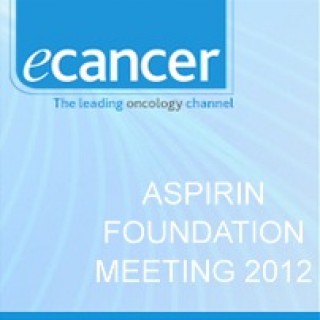
Aspirin Foundation Meeting 2012
Follow Aspirin Foundation Meeting 2012Interviews and discussion from the Aspirin Foundation Meeting in London.
- Nov 16, 2012 LATEST EPISODE
- infrequent NEW EPISODES
- 4m AVG DURATION
- 7 EPISODES
More podcasts from ecancer.org
Latest episodes from Aspirin Foundation Meeting 2012

Side effects of treating with aspirin: Prof Peter Elwood – Cardiff University, UK
While aspirin does increase bleeding from the stomach, the bleeds are minor. Prof Elwood notes that overall, aspirin prevents much more serious conditions than it can potentially cause. Evidence also shows that this bleeding occurs mainly in cases of untreated hypertension and untreated gastric problems. In these cases, other drugs treat these problems and allow for the benefits to take affect. In addition, Prof Elwood discusses the complication of helicobacter pylori, which increases the risk of bleeding substantially.

Meta analysis of the CAP 2 trial and the Add Aspirin study: Dr Ruth Langley – Medical Research Council, London, UK
Dr Ruth Langley talks to ecancer at the 2012 Aspirin Foundation meeting in London about the treatment of cancer with aspirin and the meta-analysis of Prof Peter Rockwell’s randomised trials that examined at the vascular effects of aspirin. The CAP 2 trial involved patients presdisposed to cancer, due to Lynch syndrome, and found a significant reduction in development of cancers when patients took aspirin daily. Results also showed that aspirin improves overall survival when taken after diagnosis and a reduction in the chance of recurrence. Dr Langley also discusses the design of the ‘Add Aspirin’ study, which will incorporate four randomised trials.

The Helico Eradication Aspirin Trial (HEAT): Prof Chris Hawkey – The University of Nottingham, UK
The Helico Eradication Aspirin Trial (HEAT) is an intervention trial that aims to reduce gastro and intestinal bleeding with aspirin. It's a widely held belief that aspirin can cause ulcers, but this only occurs in high doses. Prof Hawkey explains that ulcers are caused by other factors and aspirin increases the risk of bleeding in these cases. The HEAT trial examines helicobacter pylori, which is believed to cause bleeding peptic ulcers. In the pilot study there were 2,500 patients over a six-month period identified through general practice records and it was discovered that the ulcers are eliminated by curing the helicobacter pylori infection. In addition, the trial potentially discovered that aspirin increases the antibiotic effects of eliminating this infection.

Treatment of antiphospholipid syndrome with aspirin: Prof Graham Hughes – St Thomas Hospital, London, UK
Prof Hughes discusses antiphospholipid syndrome, also called Hughes syndrome, where blood clotting in arteries and veins in pregnant women causes a lack of oxygen to reach the foetus causing miscarriages. Using blood tests, this syndrome can be identified and treated very quickly using 75mg of aspirin during the pregnancy. The success rate in treating Hughes syndrome is now 90 percent. Prof Hughes also discusses the Hughes Syndrome Foundation, which offers information on the syndrome.

Highlights of the 2012 Aspirin Foundation meeting: Nick Henderson – Executive Director, Aspirin Foundation
The executive director of the Aspirin Foundation, Nick Henderson, discusses the progress made in the discovery of uses for the drug, as well as the history of the foundation and its meetings.

Aspirin in cardiovascular disease: Prof Carlo Patrono – Catholic University School of Medicine in Rome, Italy
Prof Carlo Patrono discusses the cardiovascular risks and benefits of daily aspirin use. Aspirin has unique pharmacodynamic on platelets when taken daily. This is seen in the fact that the maximum effect of aspirin is achieved in low doses and a higher dosage does not increase the effects, preventing side effects such as bleeding.

The ASPree study: ASPirin in Reducing Events in the Elderly: Prof John McNeil – Monash University, Prahran, Australia
Prof John McNeil, chair of the 2012 Aspirin Foundation meeting, talks to ecancer about the ASPRee study, which aims to provide evidence that aspirin prolongs disability free survival. The ultimate end point of the study is to make aspirin a standard of care in elderly patients.

















